The recent recommendation by the U.S. Department of Health and Human Services (HHS) to transition cannabis from Schedule I to Schedule III has, understandably, set the industry on fire.
As the U.S. stands on the precipice of a transformative shift in its cannabis policy, industry insiders have been quick to share their insights. From acknowledging the positive change this recommendation signifies to expressing caution about the uncertain regulatory road ahead, the consensus exists somewhere between enthusiasm and weariness.
While most laud the impact this could have for banking, taxation, and a more national marketplace, there’s a palpable call for broader reforms. Many of the leaders we spoke with called for descheduling, not just rescheduling, and the urgent need to address social equity and justice.
Following Bloomberg’s ground-breaking report about HHS’s recommendation to reschedule cannabis, we’ve heard from 19 cannabis executives about what this means for the future, and here is what they had to say.
Marijuana rescheduling opens the door for increased medical research and improved scientific access
One of the prevailing sentiments shared among many of the leaders we heard from was that marijuana rescheduling would finally grant researchers the funding, access, and legal space to study cannabis properly.
As Jeffrey Zucker, co-founder and president of Green Lion Partners, indicated,
“This transition could usher in a new era of credibility and progress, facilitating extensive research, enhancing patient access to secure products, and fostering a favorable landscape for responsible business expansion. The reclassification reflects the evolving scientific insights into cannabis and its potential advantages, laying the groundwork for innovation and the conscientious growth of the market. While ultimately, it would be best for cannabis to be completely descheduled, this is a major step in the right direction.”
Chang Yi, CEO of Smokeland, stated, “If the DEA de-schedules cannabis to Scheduling III, it would signify a tremendous shift for the U.S. and international cannabis industry. We are excited to see how the DEA will review and adopt these recommendations by HHS. Most of all, we look forward to the increased medical research, product development, and overall maturation of the cannabis industry.”
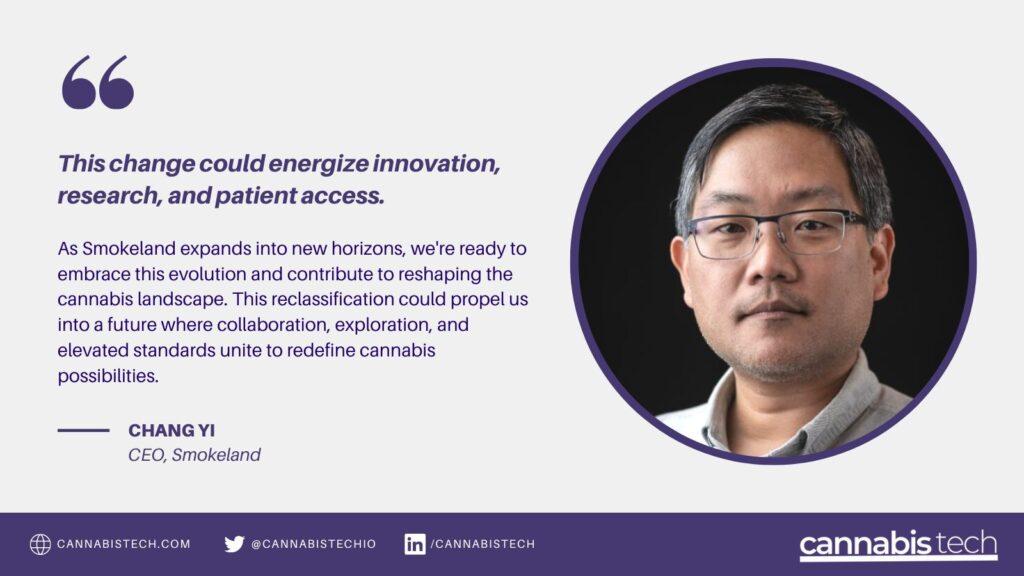
Chang underscored the importance of advancing cannabis research, saying, “This change could energize innovation, research, and patient access. As Smokeland expands into new horizons, we’re ready to embrace this evolution and contribute to reshaping the cannabis landscape. This reclassification could propel us into a future where collaboration, exploration, and elevated standards unite to redefine cannabis possibilities.”
Excitement for the potential wave of rigorous and uninhibited study was echoed by Michael Brosgard, the COO of Advanced Vapor Devices (AVD):
“This official recognition by the federal government of cannabis’ medical benefits reaffirms our conviction in the therapeutic powers of the plant. If adopted, this recommendation will remove many of the shackles that have inhibited research and open the door for increased funding, enabling critical studies in areas such as toxicology and aerosol research, fields in which AVD is actively leading several efforts.”
He expressed optimism that this recommendation “promises to pave the way for more equitable access and comprehensive scientific exploration, among many other benefits.”
Most importantly, it could be a meaningful step forward for patients
Logically, if researchers have better access to cannabis for robust scientific studies, this will conveniently translate into patient benefits thanks to improved medications, more directed applications, and enhanced drug safety.
Michael Bologna, CEO of Dip Devices, sees far-ranging implications for patients should the HHS’s recommendation come to fruition. In his opinion:
“From a medical perspective, this reclassification holds the promise of unlocking the full potential of cannabis as a therapeutic agent. It could pave the way for more comprehensive research, enabling us to better understand the intricate interactions between cannabinoids and their potential applications.”
Research, we can all agree, is long overdue. Bologna explains, “A Schedule 3 designation might improve accessibility for those who require cannabis as a medical treatment, ensuring that they receive consistent and reliable products that adhere to standardized regulations.”
A step down to Schedule III is still out of line with current clinical research, especially in comparison to other substances
While still hopeful this move will eventually lead to more substantial policy shifts, Ricardo Baca, ex-cannabis editor of The Denver Post and founder & CEO of Grasslands, nevertheless feels deflated. As he explains, “Far more dangerous and deadly substances (like alcohol and nicotine) remain unscheduled while the nontoxic cannabis plant is still improperly scheduled and federally illegal.”
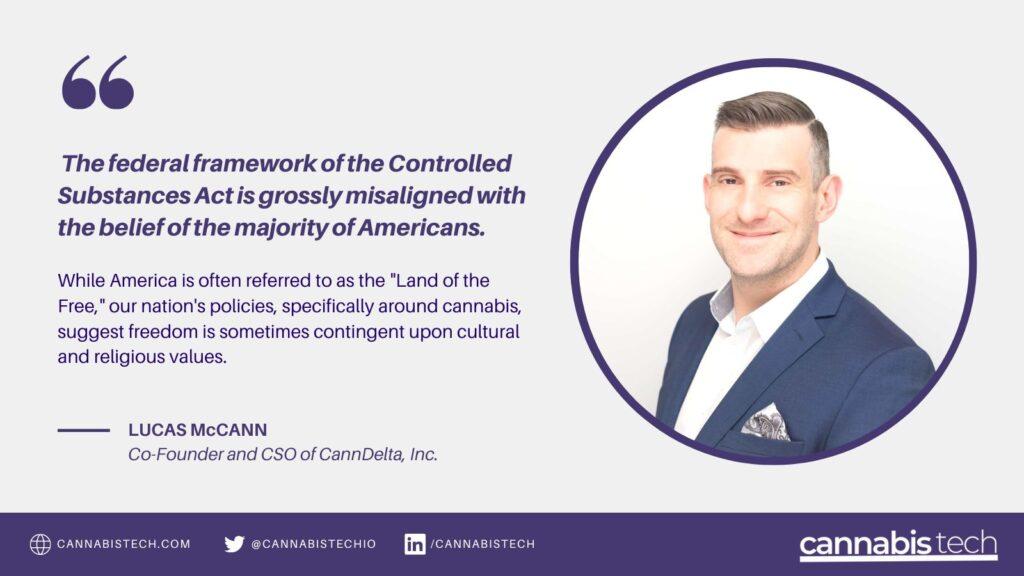
Lucas McCann, co-founder and CSO of CannDelta, Inc., agrees, stating that”[t]he classification of THC in the U.S. is one that is and continues to be deeply rooted in stigma, racism, and conservative values. The scheduling of drugs should be a reflection of recent and relevant clinical data. The list of Schedule I drugs should only include substances that truly reflect those which have no medical value and are highly addictive, such as heroin. Cannabis does not fall into either category, nor does listing it as Schedule I narcotic reflect any current scientific data.”
As McCann goes on, “Cannabis is currently legalized in some form in 40 states—this suggests that it should continue to be scheduled as is. The federal framework of the Controlled Substances Act is grossly misaligned with the belief of the majority of Americans. While America is often referred to as the “Land of the Free,” our nation’s policies, specifically around cannabis, suggest freedom is sometimes contingent upon cultural and religious values.”
Good for Big Pharma but possibly disruptive for cannabis companies
John Moynan, CEO of SLANG Worldwide, is wary about how rescheduling could play out for the cannabis companies currently operating in today’s patchwork of state markets. As he expressed to Cannabis Tech:
“I’m glad to see anything that looks like progress toward thoughtful, positive cannabis reform. That being said, I think rescheduling might create more practical operational concerns than it alleviates. While this would have a positive impact on pharmaceutical companies that are familiar with operating within that landscape, it has the potential to be disruptive for cannabis businesses operating with an adult-use focus.”
Ultimately, he is in favor of this shift, “but it could just as easily see it opening the door for more restrictive FDA regulation and Big Pharma companies.”
It would finally lead to an improved taxation and banking landscape.
At MariMed Inc., CEO Jon Levine has been pushing for changes to taxation and banking for a long time. Rescheduling could represent the light at the end of the tunnel.
As he explains, “Rescheduling of cannabis to Schedule III is a major step in the right direction. We applaud HHS for their rational recommendation and hope the DEA follows suit. We have advocated for the elimination of Section 280E of the IRS tax code for a long time, and rescheduling will accomplish that, which will be a win for the industry and consumers.”
Although he deems it “a step in the right direction,” Leslie Bocskor, CEO of Indoor Harvest Corp, feels otherwise. He suggests the recommendations won’t be adopted verbatim because “[t]he adoption of the guidance would effectively remove the 280e burden from ALL licensed and unlicensed cannabis businesses both.”
In his opinion, under the scope of the Rohrabacher-Farr amendment as it was originally passed:
“There would still be enough of a gray area potentially that federal law enforcement would still find the state schema murky negotiate,” and that “[t]his would make the gray and black market more viable and thereby increase the challenge to the legal market that it already is.” As per Bocskor, “This reason alone will likely keep it from being adopted as specifically recommended.”
Rescheduling marijuana would improve financing and debt collection options
Playing on the positive perspectives for taxation and banking services, Brett Gelfand, CEO of CannaBIZ Collects, sees rescheduling as heralding “intriguing possibilities for the cannabis industry, particularly in terms of debt dynamics.”
Within a more established market, Gelfend says, “Cannabis companies might find it easier to secure financing and manage their operations effectively.” Then, “[f]rom a debt collection perspective, this rescheduling might lead to improved repayment capabilities within the industry, as companies operating under more regulated conditions are likely to have stronger financial positions.”
The effect of the U.S. rescheduling cannabis would ripple around the world
Undeniably, if the U.S. were to change its stance on cannabis, this would impact the progression of cannabis legislation globally. Considering the U.S. was responsible for the markedly anti-cannabis stance of so much of the world to date, a move in the other direction (however minimal) could have similar implications.
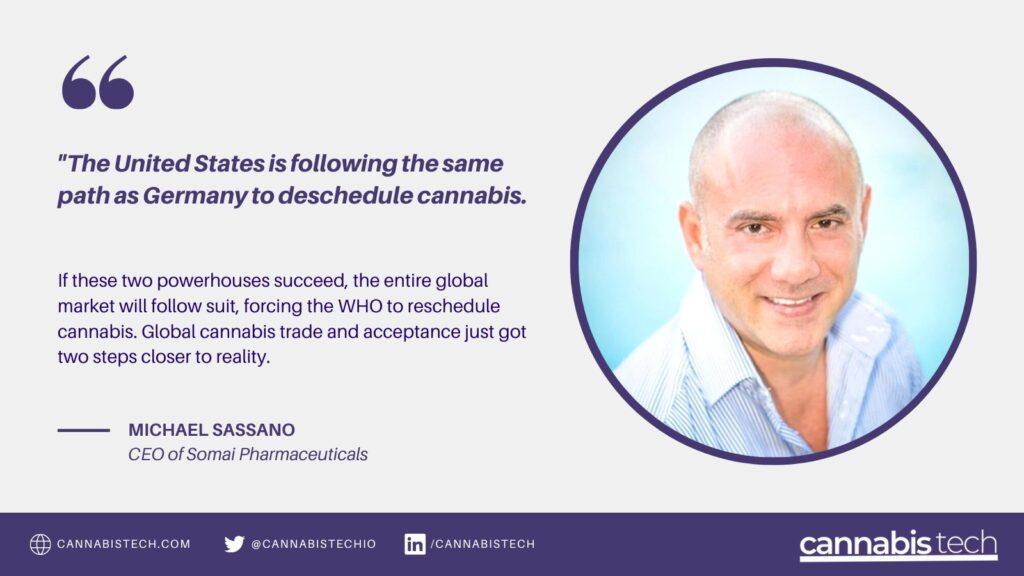
Michael Sassano, CEO of Somai Pharmaceuticals, is of the same mind, explaining that “[t]he United States is following the same path as Germany to deschedule cannabis. If these two powerhouses succeed, the entire global market will follow suit, forcing the WHO [World Health Organization] to reschedule cannabis. Global cannabis trade and acceptance just got two steps closer to reality.”
It fails to address the many systemic socio-economic impacts of the War on Drugs
Understandably, given the last 50 years of drug policy, many expressed that simple rescheduling wouldn’t go far enough for the many communities who have been unfairly impacted.
Leili Fatehi, partner and principal of Blunt Strategies, stated, “For over five decades, federal agencies have been at odds with the growing number of states recognizing marijuana’s medical value. Today’s announcement by the HHS, FDA, and NIDA signals a sea of change.”
Yet, in Fatehi’s opinion, even if “[r]eclassification to Schedule III could potentially resolve longstanding issues like banking and interstate commerce, which is a significant step forward […] it doesn’t fully address the need for social equity and justice in the cannabis industry.”
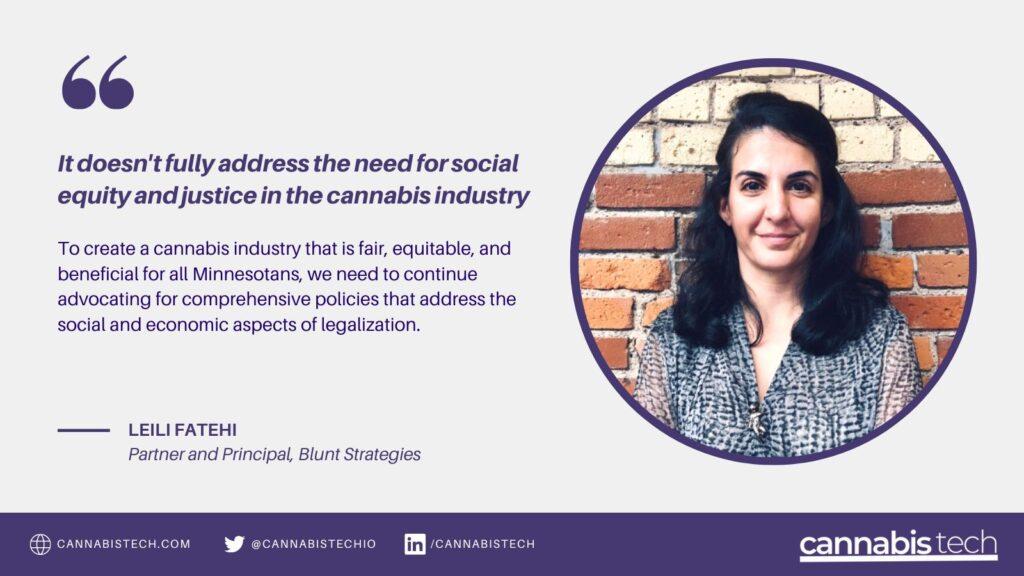
Furthermore, she explains, “To create a cannabis industry that is fair, equitable, and beneficial for all Minnesotans, we need to continue advocating for comprehensive policies that address the social and economic aspects of legalization.”
Richard M. Batenburg, Jr., CEO of The Clear, is of a similar mind, although he feels it still would represent a step in the right direction. He remarked:
“When it comes to addressing the wide range of criminal justice implications associated with prohibition, Schedule III does not go nearly far enough. But it would help pave the way for those important reforms and reduce the scope of criminal liability that Americans currently face when operating or working for state-legal cannabis companies.”
Adam Vine, co-founder of Cage-Free Cannabis, stated, ‘While a shift to Schedule 3 is a sign of progress, it falls far short of what the Biden campaign promised and what justice-impacted communities need.”
Finally, Aaron Bloom, CEO of DocMJ, said, “This shift doesn’t automatically mean a free-for-all. Stricter regulations under Schedule 3 would still apply, but the overall atmosphere seems to be one of gradual acceptance and recognition of the plant’s potential beyond its previous stigma.”
He underscored, “As the industry navigates these changes, responsible and ethical practices will be essential to ensure that the benefits are maximized while potential risks are mitigated.”
The ultimate decision still rests with the DEA and is a long way off
More than a few industry leaders we heard from expressed an optimism that was tempered with a strong dose of reality.
Justin Brandt, founding partner of Bianchi & Brandt, told CannabisTech, “There are still many unknowns surrounding how this might play out. It’s important to remember that HHS’s recommendation is not legally binding, and the Drug Enforcement Administration could choose to reclassify marijuana differently or even remove it from the controlled substances list altogether. Nevertheless, this represents a significant stride in the right direction for the cannabis industry.”
Dominick Volpini, vice president of Cloudious9 Inc., comes from a similar perspective. He noted, “While the recent recommendation by the HHS (Health and Human Services) to reschedule cannabis to Schedule 3 is undoubtedly a positive step forward, it’s crucial to acknowledge that the ultimate decision now rests with the DEA (Drug Enforcement Administration).”
The DEA’s internal review process isn’t one known for its brevity. With a department “historically known for its lengthy deliberations when it comes to cannabis-related matters,” Volpini contends, “Unless we witness decisive action from either Congress or the executive branch, it is unlikely that we will experience any immediate alterations to the existing federal cannabis policies. The road ahead may well involve further patience and persistence in our pursuit of meaningful reform.”
And from Justin Kahn, CEO and co-founder of reepher: “I’ve been watching the posts across all the social media platforms roll in. While there have been facts disclosed like 280E will go away, are true, there is a lot of speculation and conjecture about what rescheduling cannabis to Schedule 3 will look like for the state markets.
“The bottom line is no one yet knows what the impacts of rescheduling will be. HHS is making the recommendation, but what happens next is up to the DEA, unless there is an act of Congress.”
Nearly everyone agrees marijuana rescheduling from Schedule I to Schedule III doesn’t go far enough
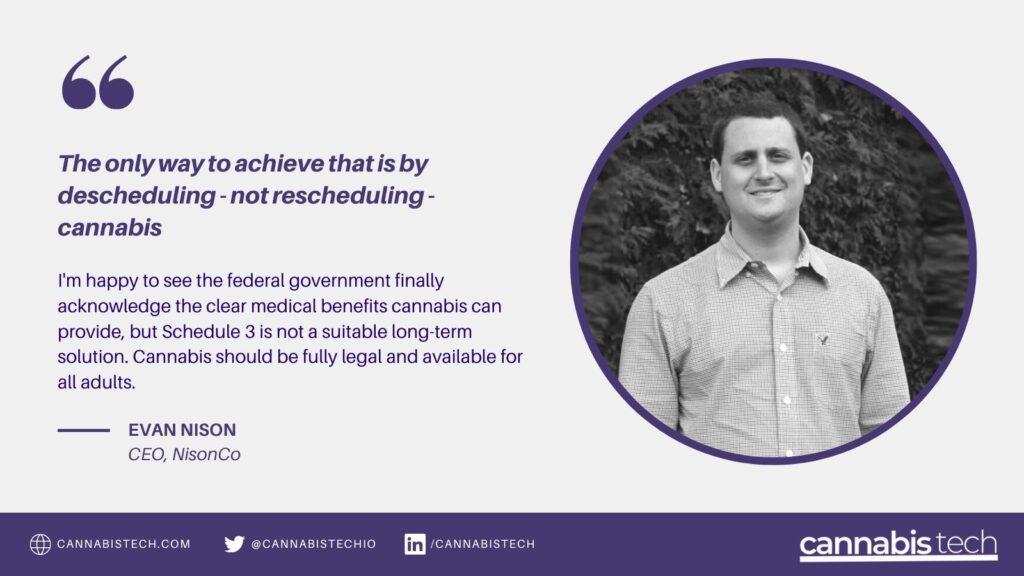
Evan Nison, the CEO of NisonCo, summarized the sentiment expressed by nearly everyone we heard from: “I’m happy to see the federal government finally acknowledge the clear medical benefits cannabis can provide, but Schedule 3 is not a suitable long-term solution. Cannabis should be fully legal and available for all adults. The only way to achieve that is by descheduling – not rescheduling – cannabis.”
Deciphering the Implications of Marijuana Rescheduling
HHS’s recommendation to transition cannabis from Schedule I to Schedule III has ignited diverse reactions within the cannabis sector. What we heard from the industry’s leaders across the sector was excitement and optimism, but undeniably the call for caution.
While many laud the potential for enhanced research and patient benefits, concerns arise about its alignment with current scientific data and potential disruptions for existing businesses. Additionally, while it might improve the taxation and banking landscape, the move doesn’t adequately address the socio-economic repercussions of past drug policies.
Ultimately, while this recommendation marks progress, many believe true reform lies in descheduling cannabis entirely. The global implications of the U.S.’s decision could reshape cannabis legislation worldwide.
Source: https://cannabistech.com/articles/marijuana-rescheduling-cannabis-leaders-respond/




